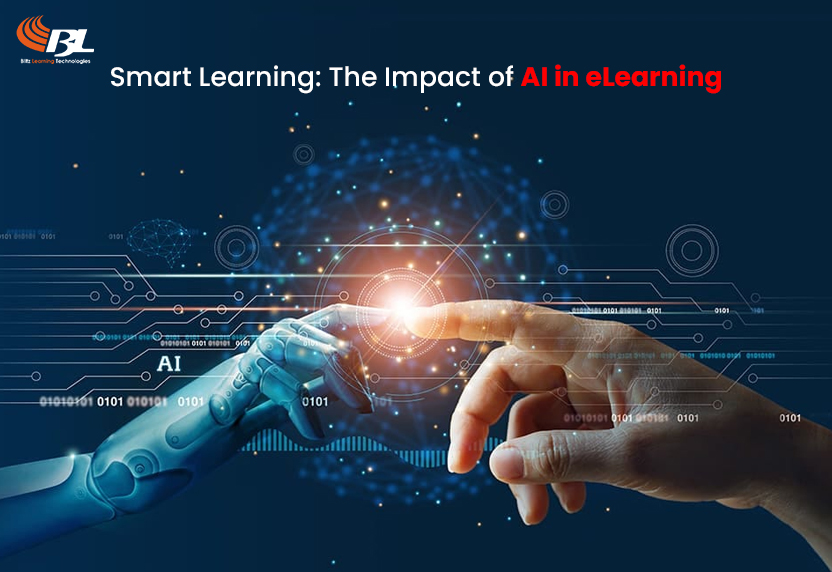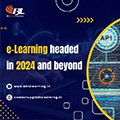
Blog
- Home
- Blog

03Jun
Smart Learning: The Impact of AI in eLearning
Introduction:
The digital revolution has transformed numerous sectors, with education being one of the most profoundly affected. eLearning, which once meant simple video lectures and online quizzes, has now evolved into a sophisticated and interactive experience. A key driver of this transformation is Artificial Intelligence. By leveraging AI eLearning platforms are providing personalized,efficient,and engaging learning experiences. This blog explores how AI is reshaping eLearning and what it means for the future of education.
Personalized Learning Experiences
One of the most significant impacts of AI in eLearning is the ability to create personalized learning experiences. Traditional classroom settings often follow a one-size-fits-all approach, where learners with different learning styles and paces are expected to conform to a uniform method of instruction. AI, however, enables a tailored approach.
AI algorithms analyze a learner’s performance, preferences, and progress to provide customized content. For example, if a learner struggles with a particular concept, the AI can identify this and offer additional resources or alternative explanations. Conversely, if a learner excels, the AI can introduce more advanced materials to keep them challenged. This adaptive learning technology ensures that each learner receives the appropriate level of difficulty and content, maximizing their potential.
Intelligent Tutoring Systems
Intelligent Tutoring Systems (ITS) are another revolutionary development in AI-powered eLearning. These systems mimic the personalized feedback and guidance provided by a human tutor. By utilizing natural language processing and machine learning, ITS can interact with learners in real time, answering questions, providing hints, and guiding them through problem-solving processes.
For instance, Carnegie Mellon University’s Cognitive Tutor provides learners with hints and feedback tailored to their specific needs, helping them understand complex concepts in mathematics. Such systems not only make learning more interactive but also ensure that help is available whenever a learner needs it, thus promoting independent learning.
Enhanced Engagement through Gamification

Engagement is a critical factor in the effectiveness of eLearning. AI enhances engagement by integrating gamification into educational content. Gamification involves applying game-design elements, such as point scoring, leaderboards, and badges, to non-game contexts. AI can analyze which gamification elements resonate most with individual learners and adapt the content accordingly. For example, a learner who enjoys competitive elements might be motivated by leaderboards and timed challenges, while another might prefer collaborative tasks and earning badges. By personalizing these elements, AI ensures that the gamified content keeps learners motivated and engaged.
AI-Driven Analytics for Trainer
While AI directly benefits learners, it also provides invaluable tools for learners. AI-driven analytics offer deep insights into learner performance and behaviour. Trainers can use this data to identify trends, understand learning patterns, and intervene when necessary.
For example, an AI system might highlight that a significant number of learners are struggling with a particular module. This information allows the trainers to review and improve the content or provide additional support. Furthermore, predictive analytics can help trainers identify learners at risk of falling behind, enabling timely intervention to help them stay on track.
Automating Administrative Tasks

AI’s impact on eLearning extends beyond teaching and learning to administrative tasks. Grading assignments, organizing course materials, and responding to learner inquiries can be time-consuming for learners. AI can automate many of these tasks, freeing up time for learners to focus on more critical aspects of teaching.
Automated grading systems, for example, can evaluate multiple-choice tests, essays, and even programming assignments with high accuracy. AI-powered chatbots can handle routine learner inquiries, such as questions about deadlines or course requirements, providing instant responses and reducing the administrative burden on learners.
Breaking Down Language Barriers
Language can be a significant barrier in eLearning, particularly in regions with diverse linguistic populations. AI-powered translation tools are breaking down these barriers by providing real-time translations of course materials, lectures, and communications. This technology ensures that language is no longer a hindrance to accessing quality education.
For instance, platforms like Duolingo use AI to personalize language learning experiences based on the user's proficiency level, learning speed, and areas of difficulty. Such tools make learning more inclusive and accessible, catering to a global audience.
Virtual Reality and Augmented Reality

AI is also enhancing eLearning through the integration of Virtual Reality (VR) and Augmented Reality (AR). These technologies create immersive learning environments that can make abstract concepts more tangible and understandable.
For example, medical learners can use VR to practice surgical procedures in a risk-free environment, while AR can bring historical events to life by overlaying digital information in the real world. AI plays a crucial role in these technologies by ensuring that the virtual experiences are interactive, adaptive, and closely aligned with educational goals.
Continuous Improvement through Feedback
AI systems continuously collect and analyze data, allowing for the ongoing improvement of eLearning platforms. This feedback loop ensures that the content and delivery methods evolve based on what works best for learners.
For example, if an AI system identifies that a particular instructional video has a high dropout rate, it can suggest revisions or alternative approaches to keep learners engaged. This dynamic adaptability ensures that eLearning platforms remain effective and relevant over time.
Ethical Considerations and Challenges
Despite the numerous benefits, the integration of AI in eLearning also presents ethical considerations and challenges. Privacy concerns are paramount, as AI systems collect vast amounts of data on learners' performance and behaviour. Ensuring that this data is used responsibly and securely is critical.
Moreover, there is a risk of over-reliance on AI, where the human element of teaching may be diminished. learners must strike a balance between leveraging AI for efficiency and maintaining the personal connection that is crucial for effective teaching and mentorship.
The Future of AI in eLearning
The future of AI in eLearning looks promising, with continued advancements expected to make education more personalized, efficient, and accessible. As AI technologies evolve, they will likely offer even more sophisticated ways to tailor learning experiences, engage learners, and support trainers.
For instance, the development of more advanced natural language processing could lead to AI systems that understand and respond to learner queries with near-human accuracy. Enhanced machine learning algorithms might provide even more precise predictions of learner performance, allowing for earlier and more effective interventions.
Conclusion:
In conclusion, AI is not just a technological innovation; it is a transformative force in eLearning. By providing personalized learning experiences, enhancing engagement, supporting learners, and breaking down barriers, AI is making education more inclusive and effective. As we navigate the challenges and ethical considerations, the goal remains clear: to harness AI's potential to create smarter, more impactful learning environments for everyone.

Neha Tyagi
About authorAs a Digital Tech professional with significant experience, Neha Tyagi has mastered the art of teamwork. Throughout her career, she maintains a commitment to continuous learning. Currently, Neha is delving into innovative technologies aimed at transforming businesses.



Leave a comments